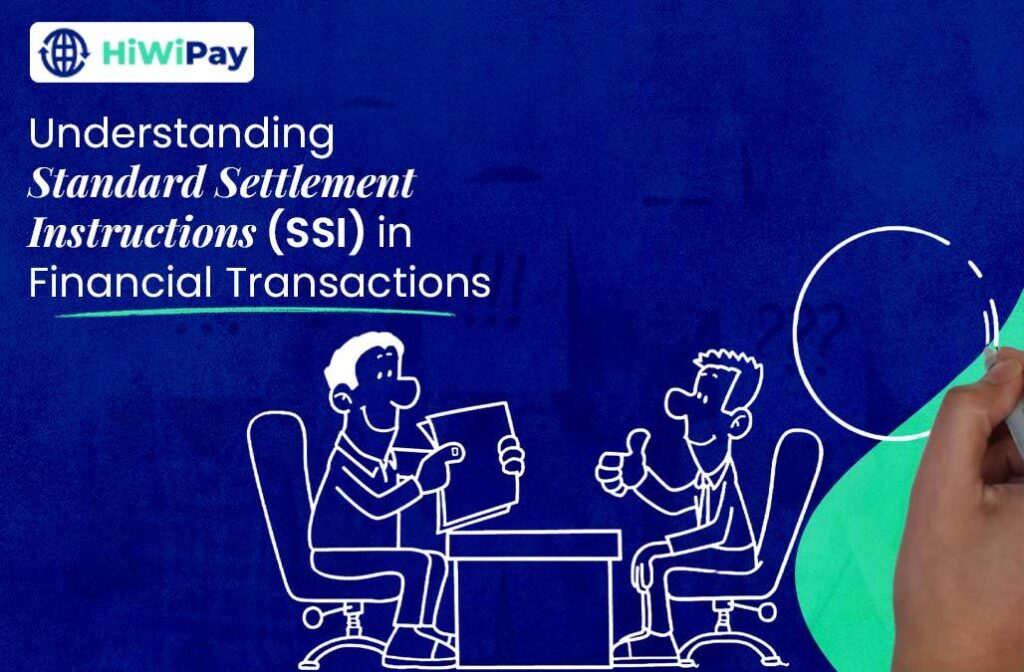What are Standard Settlement Instructions (SSI)?
Standard Settlement Instructions (SSI) are predefined, standardized templates that provide the necessary details for the settlement of financial transactions. They include information about the beneficiary, the beneficiary’s bank, the receiving institution, and other relevant parties involved in the transaction. Essentially, SSIs act as a blueprint for executing a financial transaction, ensuring that all parties are on the same page regarding where and how funds should be transferred.
The primary purpose of SSIs is to facilitate the efficient and error-free transfer of funds and securities. By using SSIs, financial institutions can avoid the repetitive task of providing settlement details for each transaction, thereby reducing the risk of human error and speeding up the settlement process.
Also Read : Ways to Send Money to Your Kid Studying Abroad
Understanding the Components of SSIs
It is important to have a clear comprehension of the components of Standard Settlement Instructions (SSIs). Let’s delve deeper into the details of the components of SSIs and explore their significance in the settlement process.
| Beneficiary Information | This includes the name and account details of the party receiving the funds or securities. |
| Beneficiary Bank Details | Information about the bank where the beneficiary holds their account, including the bank’s name, address, and SWIFT/BIC code. |
| Receiving Institution | The financial institution responsible for receiving and processing the transaction on behalf of the beneficiary. |
| Currency Details | The currency in which the transaction will be settled, and any relevant exchange rates. |
| Settlement Account Information | Details of the account where the funds will be credited or debited, including account number and type. |
| Clearing System | The method or system through which the transaction will be processed, such as Fedwire, CHAPS, or TARGET2. |
| Additional Settlement Instructions | Any special instructions or notes pertinent to the transaction, such as reference numbers or compliance information. |
Importance of SSIs in Financial Transactions
SSIs play a crucial role in the financial industry for several reasons which include:
- By providing a standardized set of instructions, SSIs reduce the likelihood of errors during the settlement process. This ensures that transactions are completed accurately and promptly.
- Incorrect settlement details can lead to failed transactions, resulting in financial losses and reputational damage. SSIs help mitigate these risks by ensuring that all necessary information is accurately communicated.
- Errors in settlement instructions can be costly, involving manual intervention, corrections, and potential penalties. SSIs streamline the process, reducing operational costs.
- Financial transactions are subject to stringent regulatory requirements. SSIs help ensure compliance by providing a clear and consistent framework for settlements.
- The use of SSIs automates the settlement process, freeing up resources that can be allocated to other critical tasks, thereby enhancing overall operational efficiency.

How are SSIs Maintained and Updated?
Maintaining and updating Standard Settlement Instructions is a critical aspect of their effectiveness. Financial institutions must ensure that their SSIs are up-to-date and accurate to avoid any disruptions in the settlement process. Here’s how SSIs are typically maintained and updated:
- Regular Reviews: Financial institutions conduct regular reviews of their SSIs to ensure that all details are current. This involves verifying the accuracy of beneficiary information, bank details, and other components.
- Communication with Counterparties: Institutions must maintain open lines of communication with their counterparties to stay informed about any changes in settlement instructions. This helps in promptly updating SSIs when necessary.
- Automated Systems: Many institutions use automated systems to manage SSIs. These systems can flag discrepancies, prompt reviews, and facilitate the efficient updating of instructions.
- Compliance Monitoring: Regular compliance monitoring ensures that SSIs adhere to regulatory requirements. Institutions may conduct internal audits or engage third-party auditors to review their SSIs.
- Training and Awareness: Staff involved in the settlement process must be adequately trained and aware of the importance of maintaining accurate SSIs. Ongoing training programs can help keep staff updated on best practices and regulatory changes.
Also Read : Prodigy Finance Abroad Education Loan Process
Common Challenges in SSI Usage
Despite numerous benefits, there are still challenges associated with it. Some most common issues with the use of Standard Settlement Instructions are as follows:
- Incorrect or Incomplete SSIs: When SSIs are incorrect or incomplete, it can cause trade failures or delays. It is essential to have a clear policy that outlines all the required information for a successful trade settlement.
- Complexity: Managing SSIs can be complex, especially for institutions dealing with multiple counterparties and jurisdictions.
- Regulatory Changes: Frequent changes in regulatory requirements can necessitate constant updates to SSIs, which can be resource-intensive.
- Technological Integration: Integrating SSIs with existing systems and technologies can be challenging, particularly for institutions with legacy systems.
- Counterparty Coordination: Ensuring that counterparties are aligned and that their SSIs are synchronized can be difficult, leading to potential mismatches and errors.
Conclusion
Standard Settlement Instructions in financial transactions are an indispensable part of financial transactions, ensuring that payments and securities are settled accurately and efficiently. By understanding their components, importance, and the challenges associated with their usage, financial institutions can better manage their settlement processes and reduce risks. As the financial landscape continues to evolve, the role of Standard Settlement Instructions will remain crucial in facilitating seamless and secure transactions.
FAQ of Standard Settlement Instructions in Financial Transactions
What are Standard Settlement Instructions (SSI)?
Standard Settlement Instructions (SSI) are pre-defined instructions used to ensure the accurate and efficient transfer of funds and securities between financial institutions. They detail the necessary account information, intermediary banks, and currency specifications to facilitate smooth transaction settlements.
Why are SSIs important in financial transactions?
SSIs are very important when it comes to ensuring that the transfer of funds is accurate, efficient, and secure. It aims at reducing the risk of errors, delays, and settlement failures. They also help mitigate operational costs and enhance regulatory compliance.
What are the key components of SSIs?
The key components of Standard Settlement Instructions (SSIs) include beneficiary information (such as the name and account number), intermediary bank details (including SWIFT/BIC codes), the currency of the transaction, the value date, and any special instructions required for processing the transaction.
How are SSIs maintained and updated?
SSIs are maintained and updated through a centralized database, periodic audits, and automated systems to ensure accuracy and timeliness. Effective communication protocols are also established to promptly inform relevant parties of any changes.
How do SSIs contribute to the security of financial transactions?
SSIs contribute to the security of financial transactions by ensuring that accurate and standardized instructions are followed, minimizing the risk of errors and fraud. They help maintain the integrity of the transaction process by clearly defining the transfer details and involved parties.
What are security settlement instructions?
Security settlement instructions are a mechanism that initiates the exchange of securities and cash between a buyer and seller.
What is standard settlement?
Standard settlement refers to the process by which financial transactions are completed according to predefined instructions, ensuring the accurate transfer of funds or securities between parties within a specified time frame. It involves the use of standardized protocols and instructions to minimize errors and delays.



